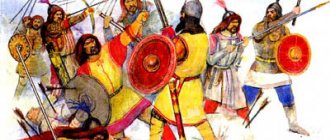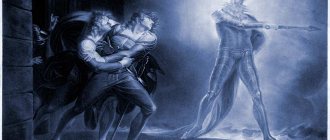- Summary
- /
- Pushkin
- /
- Belkin's stories
Year: 1830 Genre: cycle of stories
Among the numerous works of A.S. Pushkin there is a small cycle under the general name “Belkin’s stories”. Belkin is a fictional character who died in 1828, according to Alexander Sergeevich’s plan, and is the author of these 5 stories. His biography is described in the preface to them. The cycle itself was created in 1830 and is notable for being Pushkin’s first completed prose work.
Undertaker
In the story “The Undertaker” we meet Adriyan Prokhorov. He and his family move to a new house. When meeting his neighbors, he is invited to visit the shoemaker Gottlieb Schultz. The company was cheerful, there were a lot of jokes, but one of them was unsuccessful. The guests decided to toast each other’s clients, and since everyone present was each other’s clients, they drank to the whole company. Only Adrian had no one to drink to, because his clients were dead. He was asked to drink to the dead, which he was very offended by.
Returning home in a bad mood, Prokhorov angrily says that if this is so, then he will celebrate the housewarming with the dead, after which he goes to bed.
However, he is soon awakened by messages sent from the merchant's wife Tryukhina. She died and now Adrian’s services were required. Prokhorov went and, having completed everything that was required, was already returning home. He saw someone enter his house and wondered who it could be so late. Upon entering, he discovered that the living room was full of dead people - his former clients. Some of them even expressed a desire to hug Prokhorov, but Adrian pushed him away, and the dissatisfied guests began to reproach him. The undertaker lost consciousness from horror.
Waking up in the morning, Adrian heard from the maid that he had not gone anywhere at night, there were no strangers in the house, and he himself, as soon as he returned from Gottlieb Schultz, went to bed. Prokhorov realized with relief that the meeting of the dead in his new home was just his bad dream. (More details)
Stationmaster
The story “The Station Agent” is written as Belkin’s memoirs. One day he was traveling on business and, being caught in the rain, stopped at the house of Samson Vyrin, who lived with his daughter Dunya. The girl was very beautiful and economical. The narrator talked with the father and daughter and found them very pleasant people.
A few years later he happened to pass through the same station again. However, Belkin did not find the same comfort in the house. Samson said that Dunya was taken away with him by deception by a young officer. Her father tried to get her back by taking a vacation, went to St. Petersburg and found this man there. He said that he loved Dunya, would not hurt her, would not leave her, and ended the conversation with that. However, the concerned father had to see his daughter. Having gone after the young man, Samson found where Dunya lived, but he was unable to talk to her. The officer kicked him out.
A few more years later, the author again drove through Samson’s station, but did not find him alive. Neighbors said that he lived in longing for his daughter, greatly worried about her fate. And after his death, Dunya and her three children came to her father’s grave and cried a lot for him. (More details)
Peasant young lady
"The young lady-peasant." Ivan Petrovich Berestov and Grigory Ivanovich Muromsky are two landowners. Their relationship does not go well, because they have different views on the economy and therefore hardly communicate. Muromsky has a daughter, Lisa. Berestov has a son, Alexey, a university student. Having completed his studies, he returns to his father’s estate and becomes the subject of interest to all the young ladies in the area. Lisa also wants to meet him, but the unfriendliness of their fathers and class prejudices do not leave her such an opportunity. Therefore, Lisa decided to sew a peasant sundress and, pretending to be a simple girl, take a closer look at the young man.
Alexei's dog barks at the young lady in peasant attire. The young man comes to Lisa’s aid and gets to know her. The girl introduces herself as the blacksmith’s daughter, Akulina. Alexey wants to accompany her home, but Lisa sets the condition that they will see each other only when she herself appoints. Alexey, sincerely fascinated by the “peasant woman,” agrees. Their acquaintance continues for two months.
Meanwhile, the fathers of the young men encounter each other while hunting. Berestov's horse bolted and threw its owner. Muromsky offers help and takes his neighbor to his home. After talking, both landowners suddenly saw each other as pleasant interlocutors, despite the difference in views. They decide to continue their acquaintance, and Muromsky invites Berestov and his son to visit. Lisa, frightened of exposure, asks her father not to be surprised by the appearance in which she will appear before the guests. On the appointed day, she comes out to the guests, having disfigured herself with white and antimony with a completely crazy hairstyle,
and throughout the day he behaves unnaturally and affectedly, which alienates the young man. The role was played by Lisa so artistically that Alexey did not recognize his Akulina in her at all. But now he fully appreciated the spontaneity of the “blacksmith’s daughter.”
The fathers conspire to marry their children, which is completely impossible for Alexei. And he goes to the Muromsky estate without warning to explain himself. There he finds Lisa and discovers who she really is, to the complete satisfaction of all parties. (More details)
Heroes of the work
The cycle of stories contains both main and secondary characters. Each of them is important in its own way. Main characters:
- Silvio is a hot-tempered young man. A good shooter, a former hussar. The hero was very noble.
- Marya Gavrilovna is a rich and noble bride. The girl suffered greatly from her frivolity.
- Andrian Prokhorov is a man who previously worked as an undertaker and often deceived clients.
- Samson Vyrin is a good father, a stationmaster.
- Liza Muromskaya is a young inventor and prankster.
- Alexey Berestov is a fairly smart and educated young man. He respected people for their simplicity and honesty.
Do not underestimate the role of minor characters in works. Each of them makes the plot more exciting and interesting. List of other heroes:
- The Count is Silvio's offender; the man treated his opponent with great respect.
- Vladimir, a poor ensign, wanted to be Marya Gavrilovna’s fiancé.
- Schultz is a funny man. Prokhorov's neighbor, a very hardworking person.
- Burmin is a colonel, the husband of Marya Gavrilovna.
- Dunya is a thrifty and beautiful girl, Vyrin’s daughter.
- Ivan Petrovich Berestov is a smart landowner.
- Minsky is a hussar who kidnapped Samson Vyrin’s daughter.
- Grigory Ivanovich Muromsky is a man who lived next door to Berestov.
Throughout the entire work, the characters interact with each other; to see exactly how, you should read a short version of the work “Belkin’s Tale”.
Shot
“The Shot” tells the story of a certain officer named Silvio, who had the unique gift of shooting completely without missing. One day this man quarreled with a colleague and was challenged by him to a duel. By lot, the first shot went to our hero’s opponent. This bullet shot through Silvio's cap, after which the opponent took his own cap filled with cherries and began to eat. Such equanimity of the young man in the face of death infuriated our officer and he refused to shoot. Silvio's opponent was a count and the honor of an aristocrat did not allow him to remain in such debt. The officers decided that the unfired shot would remain with Silvio, and he could exercise his right to it at any time.
Several years have passed. Silvio read in the newspaper that the debtor count was going to get married and considered this the right moment to settle the score. Arriving at the newlyweds’ house, he invited the count to cast lots again, and again he got the first shot. Since the secondary draw was not in the rules of duels, the count defiantly shot at the picture on the wall. Hearing the roar, the young countess came running. What she saw led her into great excitement and the count, concerned about her state of mind, also lost his cool. This is exactly what Silvio wanted; it was important for him to see the confusion of his opponent, and not to kill him. He headed towards the exit, but already at the threshold he turned around and still fired his shot. The bullet entered exactly the count's bullet in the picture on the wall. (More details)
Plot
"Shot"
In his youth, Silvio participated in a duel with a young, carefree count. Seeing that his opponent did not value life at all, Silvio refused to take a shot. The count said that he could do it at any convenient time. That's what they decided on. A few years later, Silvio learned that the count had married. He came to his house to finish the interrupted duel. The count fired first, but missed. His young beautiful wife came running at the noise, and the count was seriously frightened. This is what Silvio wanted: to see fear for his life on his opponent’s face. He shot at the wall, hitting the count's bullet, and left his house forever.
"Blizzard"
Marya Gavrilovna, the only daughter of a wealthy landowner, was in love with the poor ensign Vladimir. The girl’s parents were against this marriage, and Vladimir invited his beloved to get married secretly. Maria arrived at the appointed hour at the church, but the wedding did not take place: due to a strong snowstorm, Vladimir got to the church only in the morning. The girl was in a fever for a long time, and her parents, fearing for her life, agreed to her marriage to Vladimir. However, it was too late: the young man went to war and soon died there. Years later, Maria met Burmin and fell in love with him. But they could not get married, since Burmin said that once during a strong snowstorm he went into the temple and, out of frivolity, agreed to marry a stranger. Maria admitted that she was this girl.
"Undertaker"
Adrian Porokhov was an old, experienced undertaker. He managed to save money and move to a new house. His German neighbors invited him to visit them and during the feast they offered to drink to their clients - the dead. Porokhov was offended and returned home, where he dreamed that all those for whom he made coffins came to his housewarming party. The dead confronted him about the quality of his work. Porokhov woke up in horror and did not immediately realize that he had imagined all this.
"The Station Agent"
The station superintendent Samson Vyrin, a good-natured and cheerful old man, had a beautiful daughter, Dunya, whom he loved very much. One day, a brilliant young officer appeared at the station, fell in love with Dunya and took her to St. Petersburg. Heartbroken, Vyrin found the officer’s house and asked to return Dunyasha, but he threw the old man out the door. Having lost the meaning of life, the old man started drinking and soon died. A few years later, Dunya and her children arrived at the station, but did not find their father alive. She found his grave and cried over it for a long time.
"Peasant Young Lady"
Two neighboring landowners - Muromsky and Berestov - had not gotten along with each other for many years. When his handsome son Alexey came to Berestov from St. Petersburg, Liza Muromskaya decided to meet him. For this reason, she dressed up as a peasant and introduced herself to him as Akulina. Alexei fell in love with Akulina so much that he was even ready to go against his father’s will and marry her. Only at the last moment was Lisa’s innocent deception revealed and the happy lovers got married to the delight of their fathers, who had reconciled by that time.
Blizzard
"Blizzard". The daughter of the landowner Gavrila Gavrilovich R. was very beautiful, and in their house there were always young people who dreamed of marrying her. But Masha herself was in love with Vladimir, a poor army ensign. The girl’s father would never have given his consent to this marriage, so Vladimir decided to marry her secretly. On the appointed night, the bride left the house, got into a sleigh sent by the groom and went to church.
Vladimir headed there, but a strong snowstorm led him astray. Having gotten lost, he got where he was supposed to go only in the morning. However, I did not find either a priest or Mary there.
Masha left her room in the morning as usual, but by evening she became very ill. From her delirium, her parents realized that she was in love with her neighbor and that this love was the cause of the illness. They decided to agree to their marriage, which they notified Vladimir in a letter. But in response, he asked his family to forget about him and a couple of days later he left for the army. After some time, news came that Masha’s would-be fiancé had distinguished himself in the Battle of Borodino and then died of wounds in Moscow.
After some time, Masha had a new admirer named Burmin. Masha felt inclination towards him and realized that she could marry him. But Burmin, explaining to Maria, said that he had no right to propose to her, because he was already married, although he did not know who his wife was, where she was and what was wrong with her.
According to him, one night during a strong snowstorm, he drove into an open temple, where he was married to a young girl. He obeyed out of prank, and when the time came to kiss the bride, she looked at him, shouted: “Not him, not him,” and fainted.
Maria looked at Burmin intently and asked if he recognized that girl in her. That snowstorm turned out to be fateful, bringing them together even before they met. (More details)
Rate this piece:
- 3.61
Votes: 152
Read a summary of Belkin's Tale. Brief retelling. For a reader's diary, take 5-6 sentences
Belkin's stories
Contemporaries paid almost no attention to the image of the compiler, the creator of the book. Its reassessment was started more by a poet than a critic, the “last romantic” Apollo Grigoriev
Apollo Aleksandrovich Grigoriev (1822–1864) - poet, literary critic, translator. In 1845, he began to study literature: he published a book of poems, translated Shakespeare and Byron, and wrote literary reviews for Otechestvennye Zapiski. Since the late 1950s, Grigoriev wrote for Moskvityanin and headed its circle of young authors. After the magazine closed, he worked at Library for Reading, Russian Word, and Vremya. Due to alcohol addiction, Grigoriev gradually lost his influence and practically stopped publishing. . He turned the modest Ivan Petrovich almost into the main character of the Russian mentality, inventing a meek type, opposed to the predatory type (as a little earlier Turgenev divided humanity into Hamlets and Don Quixotes):
The type of Ivan Petrovich Belkin was almost the favorite type of the poet in the last era of his activity. <...> Pushkin's Belkin is a simple common sense and a simple common sense, meek and humble - a sense that cries out against any brilliant falsehood, a feeling that legitimately rebels against our abuse of our broad ability to understand and feel.
"Count L. Tolstoy and his works" (1862)
A little later, this idea was picked up by Dostoevsky, in whose magazine “Time” Grigoriev was published: “But I’d rather turn to our literature: everything that is truly beautiful in it, everything is taken from the people, starting with the humble, simple-minded type of Belkin, created by Pushkin. Everything we have comes from Pushkin.”
5 “A Writer’s Diary.” 1876. February. Chapter I. Section II. “About love for the people. A necessary contract with the people." .
The hero of Grigoriev’s article himself began to take a closer look at Pushkin’s book: “You won’t believe that with delight, something I haven’t experienced for a long time, I read this recently, after you, “Belkin’s Tale,” for the 7th time in my life. The writer must never stop studying this treasure. This new study had a strong effect on me. I’m working, but not at all what I wanted.”
6 L. N. Tolstoy - P. D. Golokhvastov, March 30, 1873. . And Tolstoy was working on “Anna Karenina” at this time. The letter was not sent, but soon another was written to the same addressee, with a similar assessment.
Then came the time for historical and literary studies. The first monograph was the post-revolutionary essay book-brochure by V. S. Uzin “On Belkin's Stories. From the reader's comments" (1924).
The fear that accompanies our young pranks is their main charm.
Alexander Pushkin
During the Soviet era, Belkin's Tale began to be filmed and staged. Even in silent films, “The Station Agent” (1918, directed by Alexander Ivanovsky) and “Collegiate Registrar” (1925, directed by Yuri Zhelyabuzhsky, Ivan Moskvin) were filmed based on the same story. The Moscow Art Theater actor Moskvin played the main role here, which is considered one of his best film works.
Decades later, various Soviet directors reproduced the entire cycle in sound films and television versions with varying degrees of success: “Blizzard” (1964, director Vladimir Basov), “The Shot” (1966, director Naum Trakhtenberg), “The Station Agent” (1972, director Sergei Solovyov ), “Belkin's Tales: The Undertaker” (1990, director Pyotr Fomenko), “The Young Lady-Peasant Woman” (1995, director Alexei Sakharov).
Georgy Sviridov wrote music for “The Snowstorm”, which later turned into an independent work - “Musical illustrations for the story “The Snowstorm” by A. S. Pushkin (1974).
In the year of Pushkin’s next relatively round anniversary (220 years since his birth), a large project was launched by RAMT (Russian Academic Youth Theater). Young directors will stage all of Pushkin’s stories in different theater spaces throughout the year. On June 6, 2021, on the poet’s birthday, the premiere of “The Station Agent” (directed by Mikhail Stankevich) took place.
In literature, Mikhail Zoshchenko decided on the most daring experiment - and also on a strange round date, the centenary of the poet’s death. He composed “Belkin’s sixth story” “The Talisman”, accompanying this experiment with the following preamble:
It seemed to me (and still seems) that Pushkin’s prose is a precious example from which writers of our time should learn.
Entertaining, brevity and clarity of presentation, extreme elegance of form, irony - this is what makes Pushkin’s prose so attractive. <…>
And now, after seventeen years of my literary work, I, not without timidity, begin to copy Pushkin’s prose. And for this case, I took “Belkin’s Tale” as a model. I decided to write the sixth story in the manner and in the “mask” as done by Pushkin.
The novella presents in a concentrated form the motifs of Belkin's Tales. Its action takes place on the eve and during the Patriotic War of 1812. There is passionate love, a failed duel, a qui pro quo
"Who instead of whom." Latin expression meaning confusion, misunderstanding, when one thing is mistaken for another. In the theater, this technique is used to create a comic situation. , mysterious talisman (chain with a dragon's head), accident (suicide). The “Belkin” structure of the story within the story is also carefully reproduced, preceded by an epigraph from Mikhail Kheraskov’s ode “Noble Breed”: “It is not the title that weaves your glory, / It is not the names of our ancestors.” At the same time, Zoshchenko abandons his famous “words”, his tale. Only the serious moralizing ending (the lieutenant lost the talisman given to him by the woman he loved and was saved thanks to his own courage) partly corrects Pushkin’s narrative logic. In general, “Talisman” looks organically as “Belkin’s Sixth Tale.” Mikhail Zoshchenko knew how to do this too.
Pushkin. Brief summaries of works
- Arab of Peter the Great
- Peasant young lady
- Bakhchisarai fountain
- Boris Godunov
- Robber brothers
- Shot
- Gavriliada
- Undertaker
- Dubrovsky
- Eugene Onegin
- Groom
- Pugachev's story
- Prisoner of the Caucasus
- Stone Guest
- Captain's daughter
- Little tragedies
- Bear
- Bronze Horseman
- Blizzard
- Mozart and Salieri
- Song about the prophetic Oleg
- Queen of Spades
- Feast in Time of Plague
- Belkin's stories
- Poltava
- Mermaid
- Ruslan and Ludmila
- The Tale of the Golden Cockerel
- The Tale of the Dead Princess and the Seven Knights
- The Tale of the Priest and his Worker Balda
- The Tale of the Fisherman and the Fish
- The Tale of Tsar Saltan
- Stingy Knight
- Stationmaster
- Gypsies
- Southern link
Summary of "Belkin's Tale" for a reader's diary
Full name of the author : Pushkin Alexander Sergeevich
Title : Belkin's Stories
Number of pages : 64. Pushkin A. S. “Belkin’s Tales.” Publishing house "Litera". 2021
Genre : Stories
Year of writing : 1830
The material was prepared jointly with a teacher of the highest category, Kuchmina Nadezhda Vladimirovna.
Experience as a teacher of Russian language and literature - 27 years.






